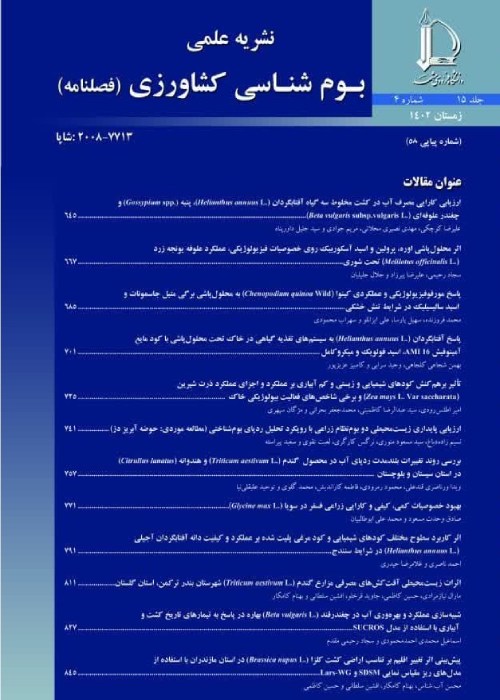Effects of Nutritional Management on Yield, Nitrogen Use Efficiency, Soil Organic Carbon and Nitrogen in Canola-Wheat Crop Rotation
Author(s):
Article Type:
Research/Original Article (دارای رتبه معتبر)
Abstract:
Introduction
Environmental concerns are raising due to nutrient leaching resulting from agricultural activities. There are new researches activities focusing on the practical management options for lowering nutrient runoff and leaching to the ground water. Alternative farming strategies such as organic and integrated fertilizer management, are being promoted recently because these managements minimize the environmental devastation.
Materials and Methods
This research was carried out at the Experimental Farm of Agronomy Department, Faculty of Agriculture, Tarbiat Modares University, Tehran, Iran (35°41ʹN, 51°19ʹE, 1215 m above sea level), during 2010-2013 growing seasons. Research farm was subjected to shallow plowing in Sep 2010 following by disk to be fully prepared for cultivation practice. Weed control was done chemically by application of Trifluralin (PubChem: 5569, 3.5 lit ha-1) afterward weed biomass using a disk incorporated into the soil. Total area for each experimental unit was 12m2 (4m×3m), the distance between each adjacent plot was one meter. There were 2m gaps between the blocks and 1m alley was also established between each plot to prevent any interferences. The experiment was conducted with a split-plot layout based on a randomized complete block design with three replications. Crop rotation (Canola-Soybean-Wheat (C1) and Canola-Wheat (C2)) provided the whole-plot treatments with nine fertilization management (F1: urea, F2: urea + zeolite, F3: composted manure, F4: composted manure + zeolite, F5: urea + composted manure, F6: urea+ composted manure + zeolite, F7: urea+ azocompost, F8: urea+ azocompost + zeolite and F9: Control) providing the sub-plots.
Results and Discussion
The variance analysis showed that fertilizer treatment main effect and interaction effects of year × fertilizer treatments, significantly affected all parameters including dry matter yield (DMY), seed yield (SY), amount of nitrogen absorbed (TNU), soil nitrogen (SN), soil organic carbon (SOC), nitrogen crop efficiency (AE) in both crops (Canola and Wheat) (Table 3). As shown in Table 4, the F6 fertilizer treatment in 2012 had the highest DMY (6885 kg.ha-1) and SY (3571 kg.ha-1) for canola, also F6 for wheat produced the highest DMY (7365 kg.ha-1) and SY (4001 kg.ha-1) in 2013. The maximum TNU was found in the F6 treatment, whereas the minimum TNU was obtained in F9 for canola and wheat (Table 4). The maximum SOC (1.22 and 1.26) was observed in the second year by the F6 fertilizer treatments while the lowest soil organic carbon (0.1294 and 0.1201) were observed in F9 in canola and wheat, respectively (Table 4). In the F6 fertilizer treatment, 16.6 and 21.0kg for canola, and 19.9 and 26.3kg for wheat of seed yield were obtained per 1kg of applied N during 2010-2012 and 2011-2013, respectively.
Conclusions
The results of this study showed that the application of organic matter resulted in increased yield of rapeseed and wheat during the four-year period of the experiment. The highest grain yield was obtained from integrative treatments with combining zeolite. Application of zeolite in all fertilizer treatments resulted in increased both crops yield, nitrogen efficiency, absorbed nitrogen content, organic carbon content and soil nitrogen. Organic matter alone or in combination with mineral fertilizers resulted in an increase in the organic carbon content and nitrogen content of the soil and eventually increased yield in both crops. There is a positive and significant relationship between soil properties and grain yield indicating that organic fertilizers improve the growth of the plant and ultimately the grain yield, by improving these indices. The results showed that using manure and zeolite is a suitable method for reducing the application of chemical fertilizers and improving stability in agricultural systems. Our results demonstrated that organic amendments and zeolite in combination of chemical fertilizer could be useful methods to achieve sustainable agricultural systems.Keywords:
Language:
Persian
Published:
Agroecology journal, Volume:10 Issue: 4, 2019
Pages:
1245 to 1257
magiran.com/p1956358
دانلود و مطالعه متن این مقاله با یکی از روشهای زیر امکان پذیر است:
اشتراک شخصی
با عضویت و پرداخت آنلاین حق اشتراک یکساله به مبلغ 1,390,000ريال میتوانید 70 عنوان مطلب دانلود کنید!
اشتراک سازمانی
به کتابخانه دانشگاه یا محل کار خود پیشنهاد کنید تا اشتراک سازمانی این پایگاه را برای دسترسی نامحدود همه کاربران به متن مطالب تهیه نمایند!
توجه!
- حق عضویت دریافتی صرف حمایت از نشریات عضو و نگهداری، تکمیل و توسعه مگیران میشود.
- پرداخت حق اشتراک و دانلود مقالات اجازه بازنشر آن در سایر رسانههای چاپی و دیجیتال را به کاربر نمیدهد.
In order to view content subscription is required
Personal subscription
Subscribe magiran.com for 70 € euros via PayPal and download 70 articles during a year.
Organization subscription
Please contact us to subscribe your university or library for unlimited access!


